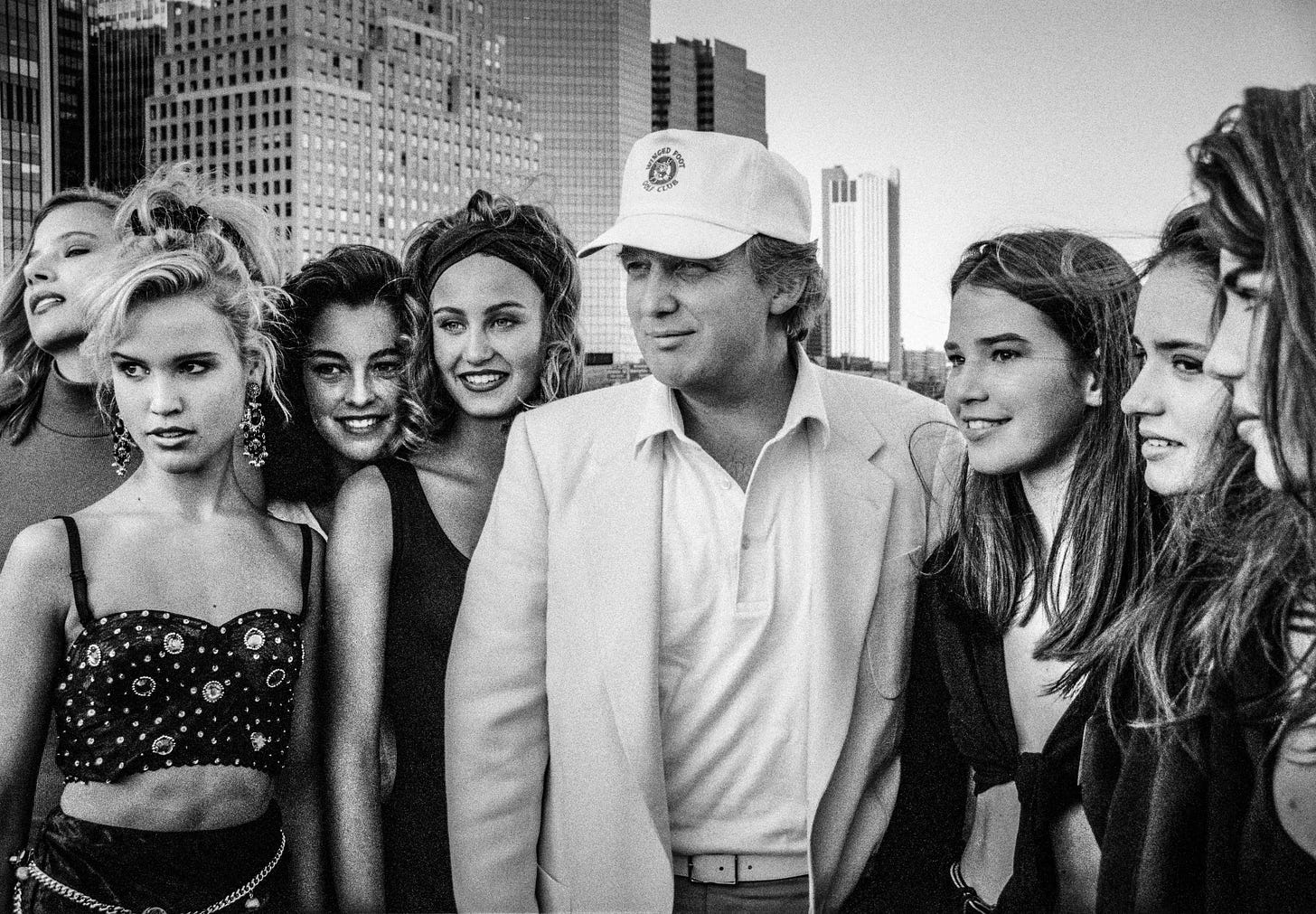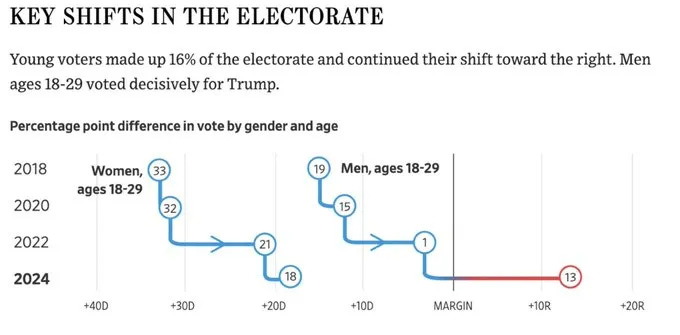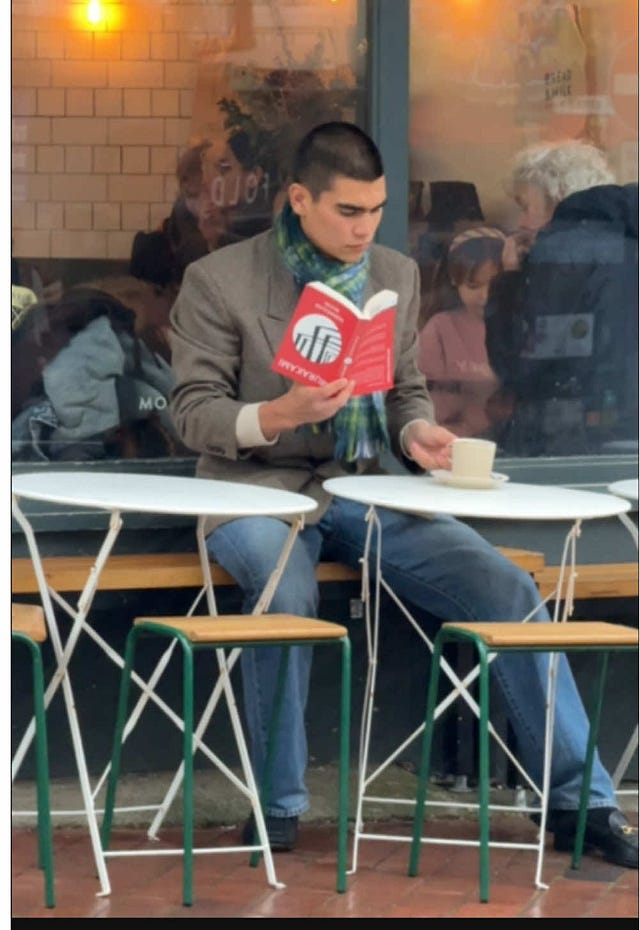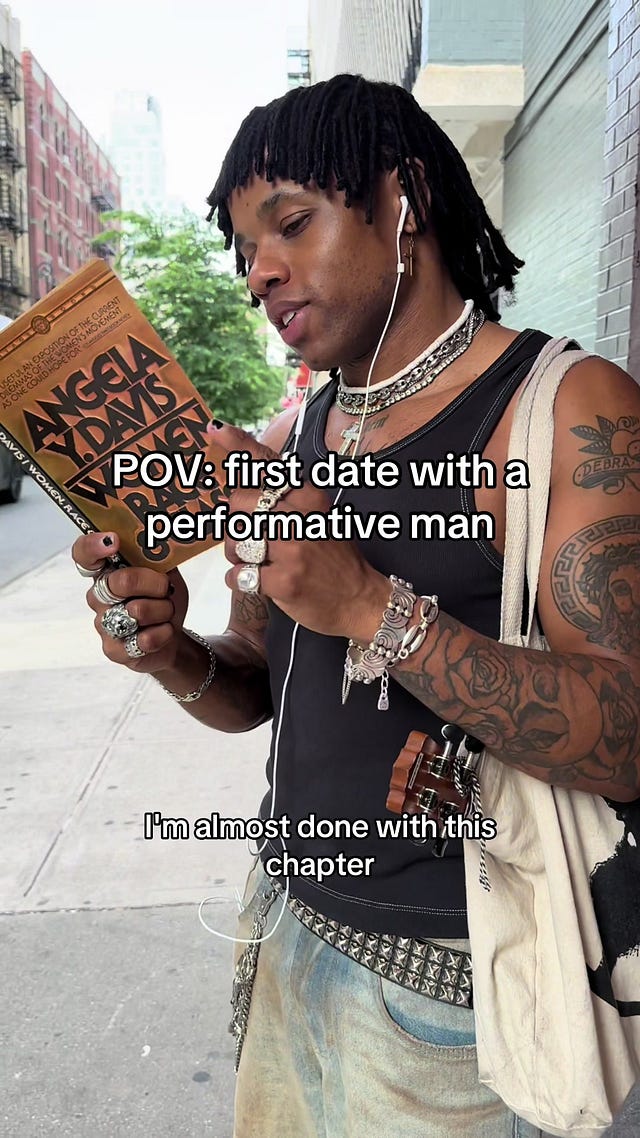📚 In Defense of the Performative Male
If No One Sees a Man Read bell hooks Is He Really a Feminist?
I must confess — I’ve always secretly wanted to be featured on @HotDudesReading.
Lord knows I’ve given the world plenty of opportunities: I read dozens of books a year, often in public, always with the faint hope that someone might notice my carefully disheveled hair, the artfully worn tote bag, the casually brilliant book choice.
This particular Saturday morning in Mexico City, I’m sitting street-side at Quentin Café in Condesa, sipping a single shot of Oaxacan espresso with what I hope is thoughtful intensity. I reach into my Monocle tote and pull out three books.
First up: Las Venas Abiertas de América Latina by Eduardo Galeano — an anti-colonial classic I’m reading to better understand gentrification for this newsletter. But reading it in one of Mexico City’s most gentrified neighborhoods feels a little on the nose.
Next: Food of the Gods by Terence McKenna — fascinating, but too early to contemplate the Stoned Ape theory.
So I settle on Bluets by Maggie Nelson, a slim volume recommended to me at McNally Jackson for its unconventional memoir structure.
I crack it open. A woman at the next table glances over. I pretend not to notice her noticing.
“Great book,” she says, smiling as she gets up to leave. Then — before I could respond — she was gone.
I sat there, savoring a small victory in the ancient art of intellectual signaling. Instinctually I pull out my phone to upload a photo of my book to Instagram, when I’m paralyzed by a sudden, unavoidable fear.
Oh God, I think, dropping my phone. Am I a “performative male”?
TL;DR — What’s a Performative Male?
All summer, social media has been flooded with an inescapable meme: The Performative Male.
He’s the feminist dude drinking matcha in a tiny beanie, reading bell hooks in public, talking about attachment styles while making long, unbroken eye contact. He’s got wired headphones playing Chiro, a tote bag with a virtue-signaling slogan — and, according to the internet, he’s not doing this because he’s evolved, but because it gets him laid.
TikTok has declared we’re in a “Performative Male Pandemic.” There was even a “Performative Male” competition in Washington Square Park, with copycat events across the country. Dozens of guys showed up reading The Feminine Mystique, tote bags slung just so. Countless parodies followed.
And now, men like me are second-guessing the contents of our tote bags, wondering if our attempts at cultivating personality have been flattened into nothing more than the latest meme.
Don’t get me wrong — I love this trend because I love laughing at myself.
I can laugh at it — I’ve been calling myself a hipster for years, which is the most un-hipster thing you can do. But I also feel the sting.
Performative Male vs. Male Manipulator
First, a distinction. TikTok tends to lump “performative males” together with “male manipulators,” and while there’s some overlap, they’re not the same species.
Male manipulators are as old as time: Casanova or Don Juan. Think Will Ferrell in Wedding Crashers, Matt Dillon in There’s Something About Mary, and on a darker level, Jeffrey Epstein.
Their methods change with the times — in my college days, their handbook was Neil Strauss’s The Game; now it’s gaslighting women with therapy-speak — but their goal stays the same: calculated deception to get women into bed.
They are wolves in sheep’s clothing. Feminism is just their latest costume.
Performative males, on the other hand, are more like the latest incarnation of the “Nice Guy.” They’re trying to be what they think women want, but their inauthenticity shows. Sometimes the performance is clumsy; sometimes it’s cringey. But unlike manipulators, they’re at least orbiting the values they’re signaling.
It all comes down to intent. And in the age of social media, where we’re all performing to some degree, intent is murky territory.
The Pandemic of Performance
The instinct to perform isn’t new — for most of history, men performed status through wealth, dominance, and power displays. Until recently, that meant something closer to Donald Trump in the 1980s: jets, models, limousines.
Now, in urban liberal culture, the status symbols have shifted: tote bags instead of Ferraris, therapy speak instead of braggadocio, a bookshelf full of Audre Lorde instead of a wine cellar. The content has changed; the signaling remains intact.
And this isn’t just a male thing. Unless you’ve sworn off social media entirely, you’re curating a version of yourself for public consumption.
Fifty-seven percent of young people say they want to be influencers. That’s not just men with tote bags — it’s all of us, all of the time.
From wellness influencers making performative land acknowledgements to dudes showing off their biceps in the gym; from an entrepreneur posting about “hustle culture” on LinkedIn from a beach in Tulum, to the “soft life” influencer whose slow living is sponsored by brand partnerships. We all create our personal brands.
We live in a Pandemic of Performance, where the boundary between who we are and what we show has thinned to the point of vanishing.
Social media has collapsed the distinction between posting about something and being it. A black square for BLM instead of showing up to a march. A TikTok haul of reusable water bottles standing in for environmentalism. The “clean girl” aesthetic as a proxy for wellness. The performance of values without (necessarily) the practice.
Social media rewards the visible display of values — the more aesthetically pleasing, the better. So you don’t just read a book; you post it in golden-hour light. You don’t just cook dinner; you plate it for the feed. And algorithms notice when a man posting something “women like” gets more engagement. We are encouraged to repeat the content that performs best. And those digital rewards now shape our offline behavior.
Meanwhile, the broader information ecosystem has primed us to believe everything is fake and everyone has an angle. The corrosive effect of misinformation isn’t just to spread lies, but to erode trust in society entirely. In that atmosphere, a man reading Sally Rooney in a café is immediately suspect.
Why This Meme Hits Different
Perhaps I’m defending the Performative Male because I see my younger self in him.
I grew up believing love was conditional: get good grades, win approval; be unabashedly yourself, invite criticism. That conditioning runs deep. You grow into an adult believing you must do something — or be someone else — to earn connection.
This led me to become a Nice Guy in adolescence, adapting myself to whatever I thought women wanted. As a solution, I even dipped into The Game, curious if pickup artistry was the answer. It wasn’t. The same hollow hunger for validation remained.
Today, Andrew Tate sells Gen Z men the same false promise: stop being awkward, revert to retrograde masculinity, and you’ll get the girl. It’s a promise as seductive as it is dangerous. Because unlike progressive spaces, they have a very low bar to entry.
Which is why shaming men for awkward beginnings doesn’t push them toward growth. It pushes them toward the voices telling them what they want to hear.
Little wonder Gen Z has a crippling fear of being cringe. This is essentially the progressive version of shaming virtue-signaling — but it’s aimed at the demographic that has become the electorate’s most critical swing voters, as as Johnny Bowman noted. The Wall Street Journal found that between 2022 and 2024, young men shifted from supporting Democrats to to supporting Trump by 13%.”
Perhaps we need to give young men a bit more freedom to be cringe.
The Triple Bind of Modern Masculinity
Men in 2025 are caught in a bind.
On one hand, the manosphere says never be vulnerable, preaches defensiveness and blames everyone else. On the other, progressive spaces demand that men expand their perspectives, read women authors, and interrogate their privilege. Then there’s the wellness-to-conspiracy pipeline, which turns skepticism of Big Food into anti-vax paranoia about where any man who’s had the jab is automatically “feminizied.”
The result? Men are somehow too masculine, not masculine enough, and fake masculine and fake feminist — all at once.
Meanwhile, the data is grim: men are falling behind in almost every metric. In 2021, they earned just 42% of bachelor’s degrees — the lowest share ever recorded. Boys graduate high school at lower rates than girls in almost every state. Fiction reading among men has dropped to just 27.7%, while women’s rates remain significantly higher. Most have no close friends. Only 7.2% are in therapy. Young men are retreating into podcasts, video games, and porn instead of engaging with life.
That’s why this meme irks me: men are barely reading at all, and when some do try — let alone with bell hooks — we mock them as performative.
I get it: women are jaded by the paucity of mature, emotionally available men. And when my girlfriends do find one, too often the whole personality turns out to be just a performance. But here’s the irony: we complain that men don’t engage with women’s perspectives, and when they do, we assume it’s calculated.
I’m not defending manipulators who treat feminism like a pickup handbook. But maybe we could be gentler with men who are genuinely trying to become better humans, even if they’re doing it awkwardly.
So yes — maybe some men are holding upside-down books in cafés. But at least they’re holding books. The path to authenticity often runs through performance.
 Tiktok failed to load.
Tiktok failed to load.Enable 3rd party cookies or use another browser
From Yoga Poser to Yoga Practice
I must admit, when I took my first yoga class in college, my first thought was — I’ve hit a gold mine of babes. I was the only guy in the class. My motives were less than pure, but it felt better than trying to “neg” girls at bars, as recommended by The Game.
Was I sincere in my practice? Partially. But nearly twenty years later, I’m still on the mat. Somewhere along the way, the opportunism gave way to genuine practice.
And so I wonder — if a guy reads Sister Outsider to impress a woman but ends up understanding intersectionality — does it count? If he goes to a poetry reading for a date but discovers he loves contemporary verse — does it matter how he got there?
The alternative is worse: men giving up entirely, retreating into spaces where vulnerability is weakness and women are the enemy. And as the political gap between young men and women continues to widen, I worry that making purity the price of entry for progressive spaces risks pushing more men to the other side.
To win young men back from the Andrew Tates of the world, we must embrace awkward allies — included dudes who read upside-down feminist books to meet girls.
 Tiktok failed to load.
Tiktok failed to load.Enable 3rd party cookies or use another browser
If a Man Reads bell hooks in the Woods…
I’m pondering all this as I sit at Quentin Cafe holding a paperback, a leather-bound journal and a tote bag — and yes, it happens to be a Monocle tote because I subscribe to support print journalism. An incorrigible hipster to the end.
No, I don’t listen to Charli XCX, but I do read in cafés — sometimes Didion, sometimes Hemingway, sometimes Maggie Nelson. And if you ever see me sporting a Labubu, you have permission to choke me to death with it.
Does this make me a performative male? So be it. These days, we’re all dancing monkeys for the algorithm.
Just let me sip my espresso and read Bluets in peace — and in public.
I’m mid-thought about all this when I realize fifteen minutes have passed. My espresso is cold. Bluets is still open to the first page. I’m staring at my phone, the TikTok algorithm having swallowed me whole in the search for videos about performative males. I stop trying to post a photo of my book and turn off my phone.
Maybe it doesn’t matter whether someone sees me reading.
Maybe next time I’ll leave my phone at home, walk into Bosque de Chapultepec, and read where no one can witness it.
Because if a man reads feminist literature in the woods and no one sees it — maybe that’s when he’s truly evolved.









really loved reading this Marko! considered + important perspective to shed light on these issues
Great article Marko, some thought provoking observations there. Speaking of Sally Rooney whom you mentioned, her latest book is a wonderful read. Highly recommended if you haven’t got round to it yet. Even better if you’re a fan of chess!